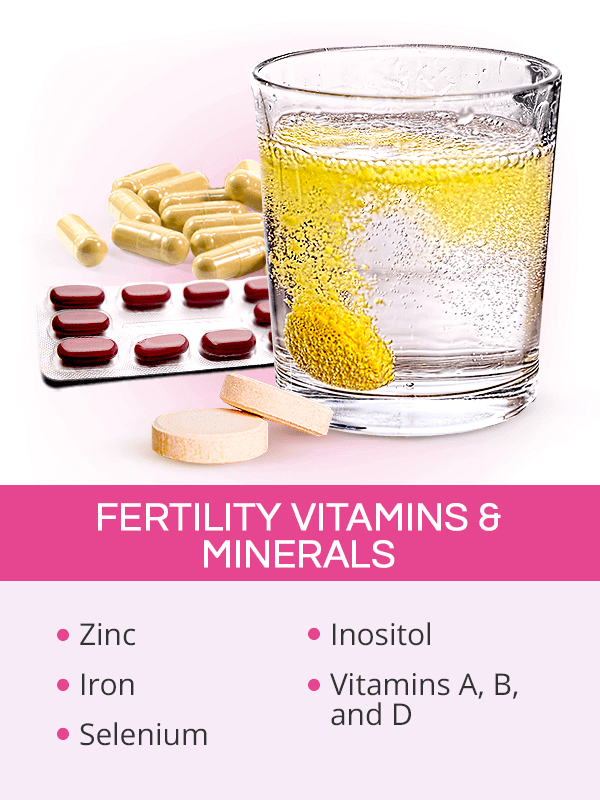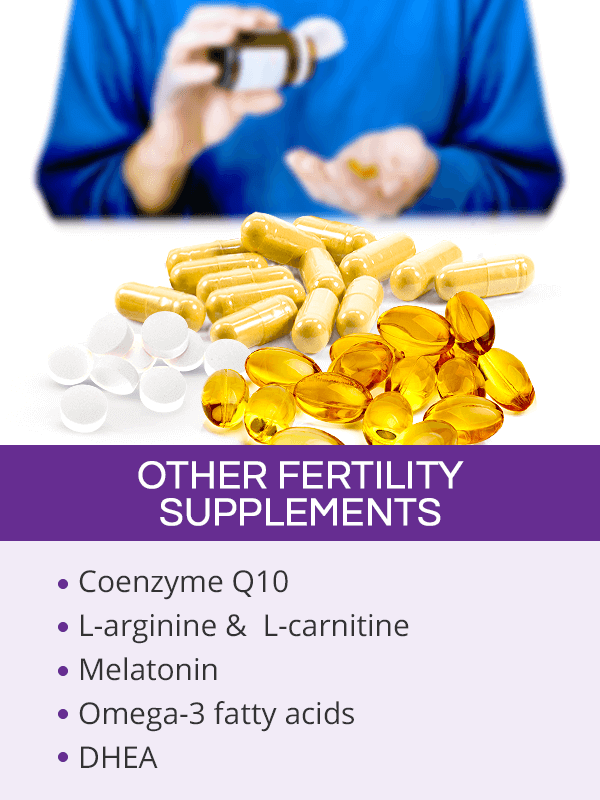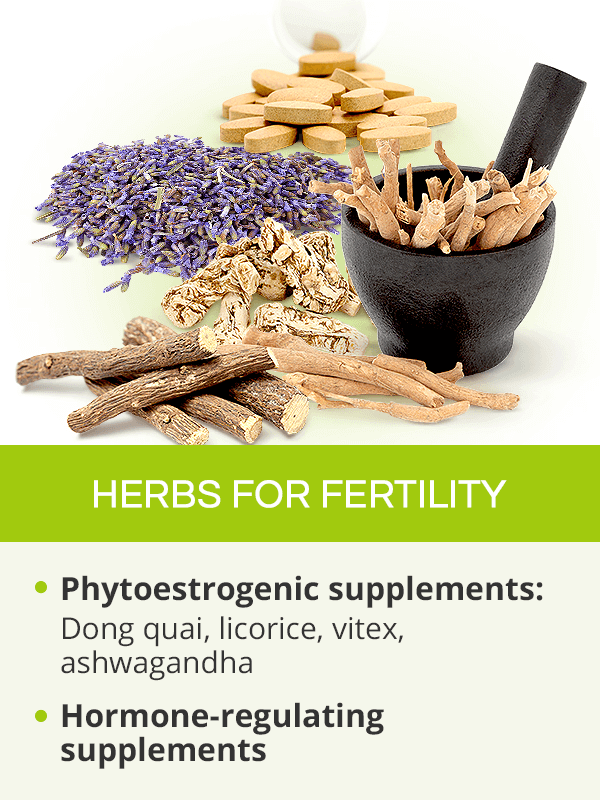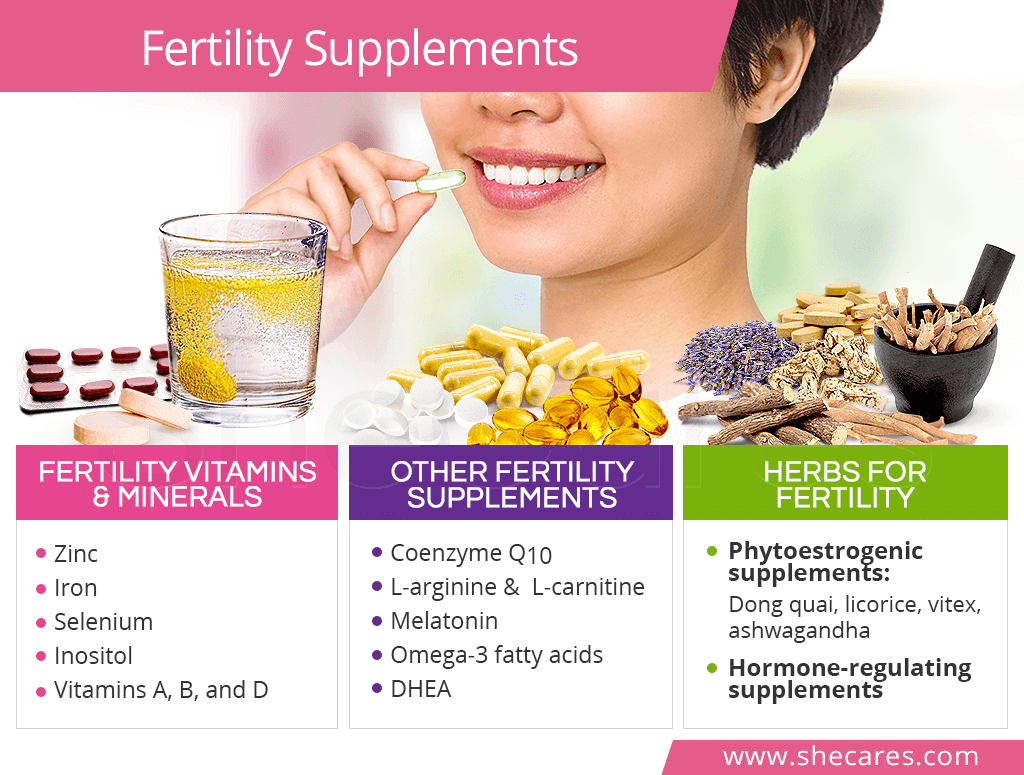Fertility Vitamins & Minerals

Ideally, the majority of essential pre-pregnancy vitamins and minerals should be obtained through a fertility diet. However, when a woman's diet is lacking in nutrients necessary for proper functioning of the reproductive system, nutritional deficiencies might develop that hinder her fertility.
The most common minerals and vitamins for female fertility might include the following:
Vitamin A supplements contribute to fertile cervical mucus that is conducive and nutritious to sperm so that they survive for longer in the reproductive tract and fertilize the egg. The vitamin also improves the efficiency of the follicle to mature and release the egg for fertilization.
Vitamin D supplements can improve the development of eggs in the ovaries. Studies have shown that women with normal levels of vitamin D have higher pregnancy rates and live births, both conceived naturally and through in vitro fertilization (IVF).
Zinc is necessary for the maturation of the eggs in the ovaries before ovulation and their transport through the fallopian tubes down to the uterus. Its supplementation might also play a role in hormone regulation, which ensures healthy menstrual cycles.
Iron supplements might prevent ovulation disruption and irregular periods by ensuring that enough oxygenated blood reaches the reproductive organs, including the ovaries where the eggs are maturing.
Selenium supplements might optimize the development of the follicles in the ovaries that contain the eggs. As such, normal selenium levels have been associated with better-quality follicles, which is a determinant of healthy ovulation.
Vitamin B complex supplements contain eight vitamins, which work to ensure hormonal balance, especially of progesterone, which translates to regular periods, proper egg development, and healthy ovulation. Balanced levels of B vitamins also decrease the risk of a miscarriage.
Inositol, especially when supplemented together with melatonin, can be useful in boosting fertility among women who have poor egg quality, irregular cycles, or anovulation due to conditions such as polycystic ovary syndrome (PCOS).
Other Fertility Supplements

Besides conception vitamins and minerals, supplements to increase fertility might also encompass other compounds that are normally created in the body and whose deficiencies might have a detrimental effect on the reproductive system. The best fertility supplements include:
Coenzyme Q10 (CoQ10) supplies energy within the eggs, which is necessary for their maturation. By that, it can help produce good-quality eggs to increase the chances of conceiving. CoQ10 fertility supplements have also shown to improve ovulation rates and endometrial thickness in women with PCOS.
L-arginine and L-carnitine supplements are both said to increase blood flow to the reproductive organs, thus improving egg production. They have also been found to indirectly decrease the risk of developing endometriosis, uterine fibroids, and PCOS by lowering the inflammation in the body.
Melatonin supplements, when taken in small doses, have shown to increase pregnancy outcomes in women undergoing ovarian stimulation for assisted reproductive technologies (ARTs). They can also aid in normalizing irregular irregular periods in PCOS women to boost their chances of getting pregnant.
Omega-3 fatty acids supplements can benefit women seeking to boost their fertility by reducing inflammation that might be behind reduced fertility.
DHEA (dehydroepiandrosterone) supplements are particularly beneficial for women with a low ovarian reserve undertaking IVF. However, those without diminished ovarian supply should be cautious as they might suffer from adverse reactions to DHEA.
Best Herbs for Fertility

Certain herbs have also been recognized for their fertility-boosting properties. Herbal fertility supplements for women can aid in regulating hormones to enhance ovulation and regulate menstrual cycles, thus increasing a woman's chances of getting pregnant.
Phytoestrogenic Herbal Supplements
These natural conception supplements contain herbs rich in naturally occurring compounds, phytoestrogens, which act similar to the body's own estrogen. As such, they regulate estrogen levels in the body and restore fertility issues caused by hormonal imbalance. The most common phytoestrogenic herbs to boost fertility include black cohosh, dong quai, licorice, vitex, royal yelly, and ashwagandha.
Hormone-Regulating Supplements
These fertility supplements, such as Macafem, tackle the underlying cause of weakened fertility from within by nourishing the endocrine system to up its natural hormone production, instead of introducing external hormones into the body. They not only balance hormones, but also regulate menstruation and increase libido, making conception more feasible. Because these herbs rarely cause any side effects, they are considered one of the safest hormone-regulating supplements to get pregnant.
Which Fertility Supplements Should I Take?
When it comes to supplements, more is not always best. Common sense, moderation, and consistency with the selected regimen are generally good approaches. The following recommendations are also worth keeping in mind:
Women most commonly benefit from taking a multivitamin containing many of the aforementioned to improve nutrition and lower the risk of ovulation problems as well as prepare the body to meet the demanding nutritional needs of pregnancy.
The preferred supplement, like a multivitamin, can be combined with any fertility-boosting herbs for optimal results.
If a woman has specific deficiencies, an individual supplement regimen might be tailored by a doctor to meet her needs.
Another option for women preparing to get pregnant is to start taking prenatal vitamins about a month before conceiving, which have similar ingredients to a multivitamin, but higher levels of folic acid and iron to sustain pregnancy and prevent birth defects.
Because over-supplementation can have adverse effects on one's health, and some supplements should not be continued once pregnancy is achieved, it is always best to consult with a doctor before starting any treatments.
Key Takeaways
As women start their pregnancy preparations, they are often on the lookout for effective fertility supplements to optimize their conception efforts and get pregnant faster. Some of the most popular options include fertility vitamins and minerals, like zinc, selenium, or vitamin B complex, to fill in nutritional gaps that might be hindering ovulatory cycles and reducing fertility. Other popular supplements to increase fertility consist of compounds essential to the functioning of the reproductive system, like coenzyme Q10, L-arginine, or omega-3 fatty acids, while herbs for fertility might include phytoestrogenic supplements, like dong quai or licorice, or hormone-regulating supplements, like Macafem.
Sources
- American Journal of Obstetrics and Gynecology. (2018). Diet and fertility: a review. Retrieved December 13, 2018 from https://www.ncbi.nlm.nih.gov/pubmed/28844822/
- American Pregnancy Association. (2017). Nutrients & Vitamins for Pregnancy. Retrieved December 13, 2018 from http://americanpregnancy.org/pregnancy-health/nutrients-vitamins-pregnancy/
- American Pregnancy Association. (2018). Prenatal Vitamin Ingredients. Retrieved December 13, 2018 from http://americanpregnancy.org/pregnancy-health/prenatal-vitamin-ingredients/
- Frontiers in Public Health. (2018). The Influence of Diet on Fertility and the Implications for Public Health Nutrition in the United States. Retrieved December 13, 2018 from https://www.ncbi.nlm.nih.gov/pmc/articles/PMC6079277/
- Journal of Bone and Mineral Research. (2012). Vitamin D Supplementation during Pregnancy: Double Blind, Randomized Clinical Trial of Safety and Effectiveness. Retrieved December 13, 2018 from https://www.ncbi.nlm.nih.gov/pmc/articles/PMC3183324/
- Your Fertility. (2018). Nutrition and supplements. Retrieved December 13, 2018 from https://www.yourfertility.org.au/everyone/lifestyle/nutrition-and-micronutrients


